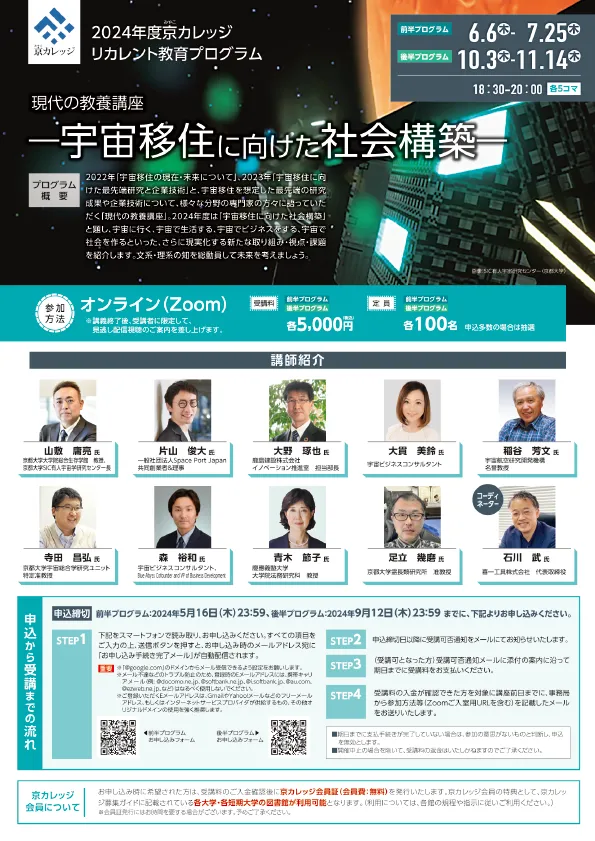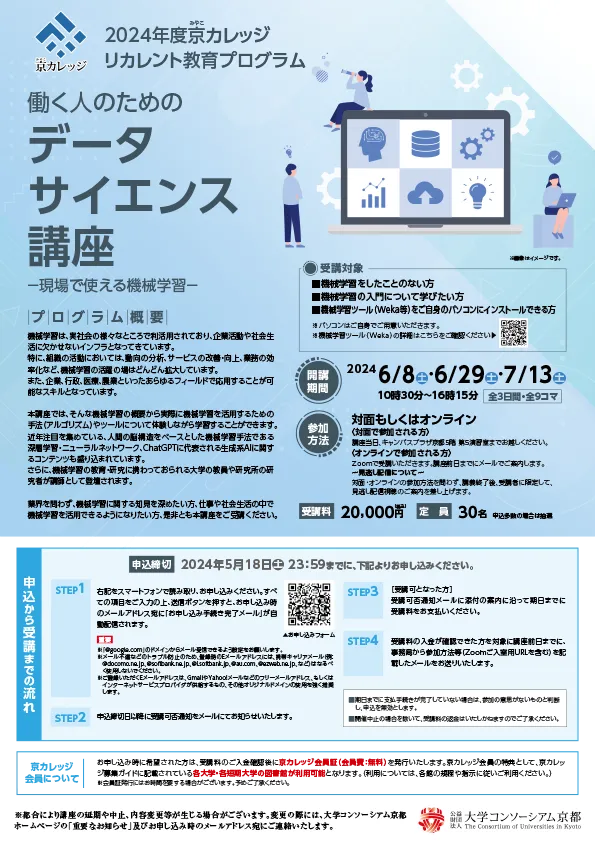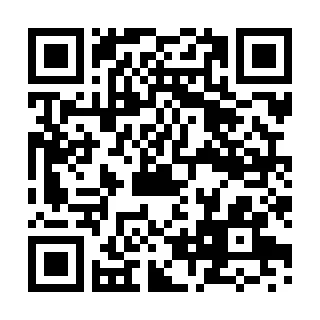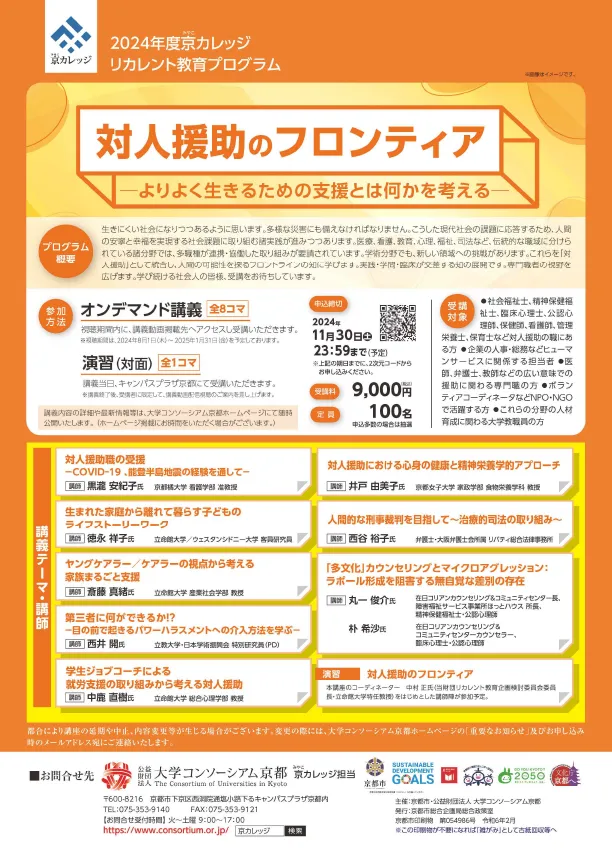- Modern liberal arts course – Social construction for space migration –
- Data science course for working people
– Machine learning that can be used in the field – - Frontiers of interpersonal assistance – Thinking about what support is to help people live better lives –
- Flow from application to enrollment
- About Kyo College members
- Contact information
Modern liberal arts course – Social construction for space migration –
<First half program>
Apply here Application deadline: 2024/5/16 (Thursday) 23:59

<Second half program>
Apply here Application deadline: 2024/9/12 (Thursday) 23:59

Please read the flyer and the contents below and apply.
Please also check the “Flow from application to enrollment” posted at the bottom of the page.

You can download the flyer here.
Event information flyer
Modern liberal arts course – Social construction for space migration – [PDF]
Program overview
Experts from various fields will discuss cutting-edge research results and corporate technologies for space migration, including 2022 “Current and future of space migration” and 2023 “Cutting-edge research and corporate technology for space migration.” “Modern liberal arts course” told by people from the world. In 2024, we will introduce new initiatives, perspectives, and issues that will make the idea of going to space, living in space, doing business in space, and building a society in space even more realistic, with the title “Building a Society for Space Immigration.” To do. Let’s think about the future by mobilizing all our knowledge from the humanities and sciences.
Event overview
| Course period | First half program [5 frames in total] 2024/6/6 (Thursday) – 7/25 (Thursday) 18:30 – 20:00 Second half program [5 frames in total] 2024/10/3 (Thursday) – 11/14 (Thursday) ) 18:30-20:00 |
| How to participate | Online (Zoom) *After the lecture, we will provide information on how to watch the missed lecture only to those who have attended the lecture. |
| Tuition fee | First half program 5,000 yen (tax included) / Second half program 5,000 yen (tax included) |
| Capacity | First half program 100 people / second half program 100 people *If there are many applications, a lottery will be held. |
Lecture content
[First half program]
|
Date and time: June 6th (Thursday) 18:30-20:00 Theme: Core Society Conditions for Space Immigration (I) Lecturer: Yosuke Yamashiki (Professor, Kyoto University Graduate School of Integrated Survival Studies, Kyoto University SIC Manned Personnel) Director of Cosmology Research Center) |
|
| In building a space society, we will evaluate the establishment of a survival base in space, which is a prerequisite for building a society, from the transfer status of core biome and core technology, and consider the necessary legal development and medical care. We will consider whether it is possible to build a space society using such steps and scale. | |
|
Date and time: June 13th (Thursday) 18:30-20:00 Theme: Super fast understanding! Space Business Lecturer: Toshihiro Katayama (Co-founder & Director, Space Port Japan General Incorporated Association) |
|
|
Nowadays, all businesses are rapidly expanding into space. Industries that were previously thought to be unrelated to the space industry, such as travel, logistics, communications, finance, real estate, trading companies, advertising, art, entertainment, and big data, are moving into the space industry one after another. With the themes of “Why space business now?” and “Where did space business come from and where is it heading?” we will examine various aspects such as history, politics, economics, geopolitics, technology, etc. “at super speed”. We will talk about the overall picture of space business. |
|
|
Date and time: June 27th (Thursday) 18:30-20:00 Theme: Artificial gravity research for space habitation Lecturer: Takuya Ohno (Director, Innovation Promotion Office, Kajima Corporation) |
|
| In the future, children born on the moon or on Mars will be forced to live in such environments even though they did not wish to do so. Furthermore, your body may not be able to stand on Earth on its own. This could lead to the division of humanity. Therefore, we would like to introduce an artificial gravity facility that will help you complete and maintain your body so that you can return to Earth. | |
|
Date and time: July 18th (Thursday) 18:30-20:00 Theme: Space migration pioneered by circular economy Lecturer: Misuzu Onuki (Space Business Consultant) |
|
| Along with space 3D printing, the concept of 3R has also entered space travel. A planetary society is established on the premise of ISRU (Planetary In-Situ Resource Utilization), and we aim to create a socio-economic system that maximizes the efficient and cyclical use of resources and added value. Let’s think together about a circular economy for space migration. | |
|
Date and time: July 25th (Thursday) 18:30-20:00 Theme: Effects on the human body in the space environment – Considering space habitation from the perspective of space medicine Lecturer: Masahiro Terada (Associate Professor, Kyoto University Space Studies Unit) |
|
| Opportunities for not only astronauts but also civilians to stay in space are increasing. Unlike living on Earth, staying in space means living in special environments such as microgravity, cosmic radiation, and a closed environment. In this lecture, we will introduce the effects on humans in the space environment. | |
[Second half program]
|
Date and time: October 3rd (Thursday) 18:30-20:00 Theme: Core Society Conditions for Space Immigration (II) Lecturer: Yosuke Yamashiki (Professor, Kyoto University Graduate School of Integrated Survival Studies, Kyoto University SIC Manned Personnel) Director of Cosmology Research Center) |
|
| In building a space society, we will consider various critical events that may occur in space, and discuss building crisis management capabilities and the resilience of a space society. | |
|
Date and time: October 17th (Thursday) 18:30-20:00 Theme: Creating a sustainable society on the moon…Thinking about humankind’s expansion into space Lecturer: Yoshifumi Inaya (Professor Emeritus, Japan Aerospace Exploration Agency) |
|
| As the first step for humanity to advance into space, we will carry out sustained manned activities on the moon, and we will consider creating and operating a group that could be called a “society” outside of Earth. Space topics are not limited to topics of technology to realize manned space activities, but also include sustainability as an economic activity, business perspective, social management methods, impact on the human body during space stay, and cultural anthropological perspective. We will think from a broader perspective, such as manned activities based in , and the future of humankind’s expansion into space. | |
|
Date and time: October 24th (Thursday) 18:30-20:00 Theme: Global trends in the field of manned space, where the private sector continues to enter Lecturer: Hirokazu Mori (Space business consultant, Blue Abyss Confounder VP of Business Development) |
|
| In recent years, the term space business has been featured in the general media, new companies such as startups have been born in many countries including the United States and Japan, and companies from a wide range of industries are also entering the space field. Lectures by instructors who are executives, directors, advisors, etc. of multiple companies and incorporated associations around the world will give an overview of manned space development in commercial space and predict future trends. | |
|
Date and time: November 7th (Thursday) 18:30-20:00 Theme: International space law for space migration Lecturer: Setsuko Aoki (Professor, Keio University Graduate School of Law) |
|
| This is a lecture on the content of international law that governs the society formed when humans migrate to celestial bodies such as the Moon or Mars. Specifically, the issues include ownership of land and resources on celestial bodies, how to identify countries that exercise jurisdiction over space bases, hotels, hospitals, etc., standards for human rights and environmental protection on celestial bodies, and the meaning of peaceful uses of space. Learn about. | |
|
Date and time: November 14th (Thursday) 18:30-20:00 Theme: Evolution of the mind and the universe Lecturer: Ikuma Adachi (Associate Professor, Primate Research Institute, Kyoto University) |
|
| Humans are one of the millions of species that exist on Earth, and the way our bodies and minds work has evolved over 3.5 billion years of biological evolution. There is a history of human evolution as well as biological constraints. In this lecture, we will consider humans living in a space environment by reconsidering the human species from a biological perspective and exploring the evolution of the workings of the human mind. | |
Data science course for working people – Machine learning that can be used in the field –
Apply here Application deadline: 2024/5/18 (Sat) 23:59

Please read the flyer and the contents below and apply.
Please also check the “Flow from application to enrollment” posted at the bottom of the page.

You can download the flyer here.
Event information flyer
Data science course for working people
– Machine learning that can be used in the field – [PDF]
Program overview
Machine learning is used in a variety of areas in the real world, and has become an essential infrastructure for corporate activities and social life.
In particular, machine learning is increasingly being used in organizational activities, such as analyzing trends, improving and improving services, and streamlining operations.
In addition, it is a skill that can be applied in all fields such as business, government, medicine, and agriculture.
In this course, you will be able to learn through experience about the methods (algorithms) and tools for actually utilizing machine learning, from an overview of machine learning.
It also includes content related to deep learning/neural networks, which are machine learning methods based on the human brain structure, and generative AI such as ChatGPT, which have been attracting attention in recent years.
In addition, university faculty members and research institute researchers who are involved in machine learning education and research will be on stage as lecturers.
Regardless of your industry, if you want to deepen your knowledge about machine learning, or if you want to be able to utilize machine learning in your work or social life, please take this course.
Event overview
| Target of course | ・Those who have never done machine learning ・Those who want to learn about the introduction to machine learning ・Those who can install machine learning tools (Weka, etc.) on their own computer *Please prepare your own computer. *Click here for details on the machine learning tool (Weka).  |
| Course period | 2024/6/8 (Sat), 6/29 (Sat), 7/13 (Thu) 10:30-16:15 [Total 3 days, total 9 periods] |
| How to participate | Face-to-face or online (For those attending face-to-face) Please come to Exercise Room 5 on the 5th floor of Campus Plaza Kyoto on the day of the course. <For those participating online> The course will be taken via Zoom. We will notify you by email the day before the course. ~About missed broadcasts~ Regardless of whether you participate in-person or online, after the lecture, only those who have attended will receive information on how to watch the missed broadcasts. |
| Tuition fee | 20,000 yen (tax included) |
| Capacity | 30 people *If there are many applications, a lottery will be held. |
Lecture content
First day
|
Date and time: June 8th (Sat) 10:30-12:00 Theme: Introduction to machine learning Lecturer: Hwang Hongxuan (Professor, Faculty of Informatics, Fukuchiyama Public University) |
|
| First, learn an overview of machine learning. Here you will learn an overview of supervised learning, unsupervised learning, and intermediate learning. You will also learn about identification and regression. Afterwards, you will learn how to use the machine learning tools used in this course. | |
|
Date and time: June 8th (Sat) 13:00-14:30 Theme: Decision tree Lecturer: Hwang Hongxuan (Professor, Faculty of Informatics, Fukuchiyama Public University) |
|
| Learn about decision trees, which perform discrimination in the form of trees. A decision tree expresses what decisions are made under what conditions. First, learn about the structure of decision trees. Next, you will learn how to think about creating decision trees and actually create decision trees using machine learning tools. | |
|
Date and time: June 8th (Sat) 14:45-16:15 Theme: Bayesian Identification Lecturer: Takuma Otsuka (Senior Researcher, Collaborative Information Research Department, NTT Communication Science Laboratories) |
|
| Learn how to identify input data into discrete labels and choose the identification result by finding the probability of each label based on Bayes’ theorem. We will also introduce advantages such as calculating the probability of each label to determine the confidence of its identification. | |
the 2nd day
|
Date and time: June 29th (Sat) 10:30-12:00 Theme: Pattern mining Lecturer: Qiang Ma (Professor, Department of Information Engineering and Human Sciences, Kyoto Institute of Technology) |
|
| Learn about pattern mining, which is a method of extracting patterns that appear more than a certain frequency in a data set. This is classified as unsupervised learning. For example, it is used to extract products that are purchased together. | |
|
Date and time: June 29th (Sat) 13:00-14:30 Theme: Logistic identification Lecturer: Mari Katsurai (Associate Professor, Department of Intelligent Information Engineering, Faculty of Science and Technology, Doshisha University) |
|
| Learn about logistic identification, a typical supervised learning method. This method calculates the probability that data belongs to a category. Learn how to apply machine learning tools to concrete problems. | |
|
Date and time: June 29th (Sat) 14:45-16:15 Theme: Support Vector Machine Lecturer: Mari Katsurai (Associate Professor, Department of Intelligent Information Engineering, Faculty of Science and Technology, Doshisha University) |
|
| Learn the basic concept of support vector machines, which have been widely used as powerful identification algorithms. This is a method to find a discriminative surface that well separates two categories of data. Identification performance may be improved by mapping the training data to a high-dimensional space. | |
Third day
|
Date and time: July 13th (Saturday) 10:30-12:00 Theme: Neural net Lecturer: Hisashi Miyamori (Professor, Faculty of Computer Science and Engineering, Kyoto Sangyo University) |
|
| Learn about neural networks, which are models that mimic the functioning of nerve cells (neurons) in the human brain. The basic idea is to decide what signal to send next based on signals from a large number of neurons. This will be the basics of deep learning that you will learn next. | |
|
Date and time: July 13th (Saturday) 13:00-14:30 Theme: Deep learning Lecturer: Hisashi Miyamori (Professor, Faculty of Computer Science and Engineering, Kyoto Sangyo University) |
|
| Learn about deep learning that connects neural networks in multiple layers. It has achieved remarkable results in fields such as image recognition, speech recognition, and natural language processing, and its scope of use is expanding. Learn about the key factors that improved its performance and the structure of the network. | |
|
Date and time: July 13th (Sat) 14:45-16:15 Theme: Generative AI Lecturer: Hisashi Miyamori (Professor, Faculty of Computer Science and Engineering, Kyoto Sangyo University) |
|
| Learn an overview of generative AI represented by ChatGPT. Generative AI is attracting a lot of attention due to its high performance and wide-ranging social impact. Learn about the basic mechanism and features, what you can and cannot do, and precautions when using it. | |
Frontiers of interpersonal assistance – Thinking about what support is to help people live better lives –
Once the details of the program are finalized, we will begin accepting applications soon.
After we start accepting applications, you will be able to apply from this page and the QR code.
We apologize for keeping you waiting.

You can download the flyer here.
Event information flyer
Frontiers of interpersonal assistance
– Thinking about what support means to live a better life – [PDF]
Program overview
I think we are becoming a society that is difficult to live in. We must also prepare for a variety of disasters. In order to respond to these challenges of modern society, various practices are being advanced to address social issues that will realize human peace and happiness. In fields that are traditionally divided into occupational categories, such as medical care, nursing, education, psychology, welfare, and justice, multi-disciplinary collaboration and cooperation are required. Even in the academic field, there are challenges in new areas. We will integrate these as “interpersonal assistance” and learn from the front-line knowledge that explores human potential. It is the development of knowledge at the intersection of practice, academics, and clinical practice. Broaden the horizons of professionals. We welcome all members of society who wish to continue learning to attend this course.
Event overview
| Target of course | ・People who work in interpersonal support jobs such as social workers, mental health workers, clinical psychologists, certified psychologists, public health nurses, nurses, registered dietitians, childcare workers, etc. ・People in charge of human services such as corporate human resources and general affairs – Professionals who are involved in aid in a broad sense, such as doctors, lawyers, and teachers. – People who are active in NPOs and NGOs, such as volunteer coordinators. – University faculty and staff involved in human resource development in these fields. |
| How to participate | During the on-demand lecture [8 frames in total] viewing period, access the lecture video location and take the lecture. *The viewing period is scheduled to be from August 1, 2024 (Thursday) to January 31, 2025 (Friday). Seminar (face-to-face) [1 class in total] The course will be taken at Campus Plaza Kyoto on the day of the lecture. *After the lecture, only those who have taken the course will receive information on how to watch the lecture video. |
| Tuition fee | 9,000 yen (tax included) |
| Capacity | 100 people *If there are many applications, a lottery will be held. |
Lecture content
On-demand lecture
|
Theme: Support for interpersonal support workers – Through the experience of COVID-19 and the Noto Peninsula earthquake – Lecturer: Akiko Kurotaki (Associate Professor, Faculty of Nursing, Kyoto Tachibana University) |
|
|
Theme: Mental and physical health and psychonutritional approaches in interpersonal support Lecturer: Yumiko Ido (Professor, Department of Food and Nutrition, Faculty of Home Economics, Kyoto Women’s University) |
|
|
Theme: Life story work of children living away from their birth families Lecturer: Shoko Tokunaga (Ritsumeikan University/Western Sydney University Visiting Researcher) |
|
|
Theme: Aiming for humane criminal trials – therapeutic justice initiatives Lecturer: Yuko Nishitani (Lawyer, Liberty Soken Law Office, affiliated with the Osaka Bar Association) |
|
|
Theme: Supporting the entire family from the perspective of young carers/carers Lecturer: Mao Saito (Professor, College of Industrial and Social Studies, Ritsumeikan University) |
|
|
Theme: “Multicultural” Counseling and Microaggressions: The existence of unconscious discrimination that obstructs the formation of rapport Lecturer: Shunsuke Maruichi (Director of Korean Counseling & Community Center in Japan, Director of Hotto House, a disability welfare service business, mental health welfare worker) (Certified Psychologist) Park Hee-sa (Korean Counseling & Community Center Counselor in Japan, Clinical Psychologist/Certified Psychologist) |
|
|
Theme: What can a third party do? ? -Learn how to intervene in power harassment that occurs right in front of you Lecturer: Kai Nishii (Rikkyo University, Japan Society for the Promotion of Science Research Fellow (PD)) |
|
|
Theme: Interpersonal support based on employment support efforts by student job coaches Lecturer: Naoki Nakaga (Professor, College of Comprehensive Psychology, Ritsumeikan University) |
|
Exercises (face-to-face)
| Frontier of interpersonal assistance | |
| Lecturers including the coordinator of this course, Tadashi Nakamura (chairman of the Recurrent Education Program Planning and Review Committee of this foundation and specially appointed professor at Ritsumeikan University), are scheduled to participate. | |
Flow from application to enrollment
STEP①
Please click the “Apply” button for each course listed above and apply by the deadline. Please note that the application deadline differs for each course. After filling out all the fields and pressing the send button, an “application procedure completion email” will be automatically sent to the email address you used when applying.
important
*Please configure your settings so that you can receive emails from the domain “@google.com”.
*To prevent problems such as non-delivery of emails, please use your mobile carrier email (e.g. @docomo.ne.jp, @softbank.ne.jp, @i.softbank.jp, @au. com, @ezweb.ne.jp, etc.) should be avoided as much as possible.
*We strongly recommend that you use a free email address such as Gmail or Yahoo! Mail, one provided by your internet service provider, or an original domain for the email address you register.
STEP②
After the application deadline, you will be notified by email of whether or not you have been accepted.
STEP③
[For those who are accepted to attend the course]
Please pay the tuition fee by the deadline according to the instructions attached to the email notifying you of your acceptance/rejection.
STEP④
The secretariat will send an email with instructions on how to participate (including the URL for Zoom entry) to those who have confirmed the payment of the course fee by the day before the course.
About Kyo College members
If you request it at the time of application, we will issue you a Kyo College (membership fee: free) after confirming the payment of the tuition fee. As a member of Kyoto College, you will be able to use the libraries of each university and junior college listed in the Kyoto College Recruitment Guide (please follow the rules and instructions of each library for use).
*It may take some time to issue your membership card.
Contact information
Consortium of Universities Kyoto
College (Kyoto Studies Course) 9:00-17:00 (excluding Sundays and Mondays)
1st floor, Campus Plaza Kyoto, Nishinotoin-dorishiokoji, Shimogyo-ku, Kyoto 600-8216
TEL. 075-353-9140 FAX. 075-353-9121
MAIL: miyakare■consortium.or.jp (please change ■ to @ before sending)
*Inquiry reception hours: Tuesday to Saturday 9:00 to 17:00 (excluding year-end and New Year holidays)















